Quick Betimate
Popular Leagues
Other Leagues
Mastering the Field: A Ultimate Guide to Become a Football Coach

Become a football coach can be fulfilling for individuals with a passion for sports and a desire to assist others. This career entails specialized training, skills, and education specific to the sport. If you aspire to be a football coach, it is crucial to comprehend the necessary qualifications, experiences, and skills needed to secure a position. In this article, we will define the role of a football coach, outline their responsibilities, discuss their annual salary, highlight essential skills, provide guidance on how to pursue this career, and offer tips for securing in the road to become a football coach.
About Football Coach Career
What is a football coach?
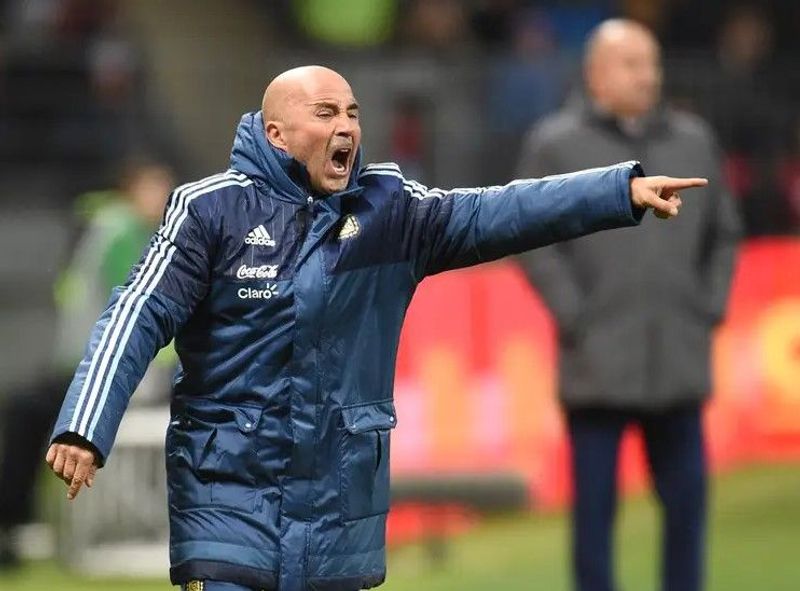
A football coach is an expert in the sport of football who guides, trains, and assists teams
A football coach is an expert in the sport of football who guides, trains, and assists teams and their players across professional, collegiate, and amateur levels. They provide instruction and guidance to players with the goal of achieving victory in football games. The specific responsibilities of a football coach can vary based on the level of coaching pursued or the type of coach one aspires to be.
Types of football coach
Player Development Coaches
Player development coaches focus on nurturing the individual talents of players. They work closely with young athletes, focusing on skill enhancement, tactical understanding, and mental development. These coaches often work at the grassroots level and have a keen eye for identifying promising young talent.
Tactical Coaches

Tactical Coaches
Tactical coaches specialize in strategy and game plans. They analyze the strengths and weaknesses of both their own team and the opposition. Their primary goal is to create effective tactics that maximize their team's strengths and exploit the weaknesses of the opposing team.
Strength and Conditioning Coaches
Strength and conditioning coaches play a crucial role in ensuring players are physically prepared for the demands of the game. They develop training programs to enhance strength, speed, endurance, and flexibility. These coaches work closely with players to optimize their physical fitness, preventing injuries and improving overall performance.
Motivational Coaches
Motivational coaches are responsible for instilling a winning mentality within the team. They inspire players to give their best, boost team morale, and foster a sense of unity and determination. These coaches are skilled motivators who understand the importance of psychological factors in achieving success.
Youth Coaches
Youth coaches specialize in training and developing young players. They introduce fundamental skills and techniques while nurturing a love for the game. Youth coaches focus on creating a positive and supportive environment where young players can grow and develop their skills.
Offensive and Defensive Coaches
Offensive coaches focus on developing attacking strategies, including plays, formations, and patterns of play. They work closely with players to enhance their attacking prowess and create scoring opportunities. Defensive coaches, on the other hand, specialize in defensive strategies, focusing on organization, marking, and preventing the opposition from scoring.
Goalkeeping Coaches
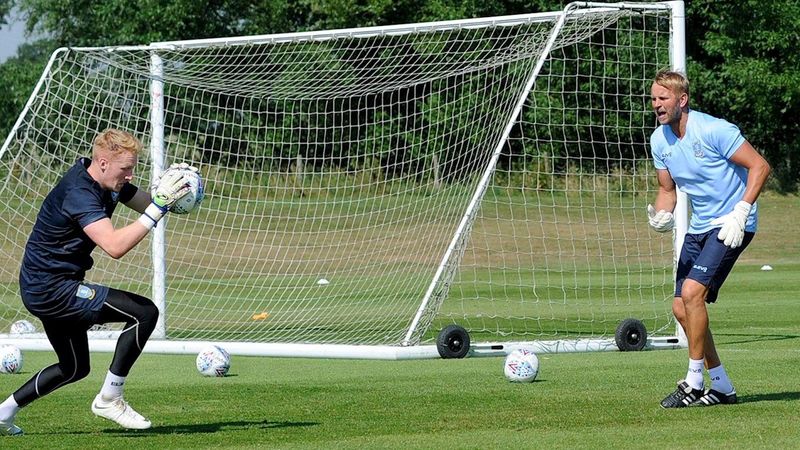
Goalkeeping Coaches
Goalkeeping coaches specifically train and develop goalkeepers. They work on improving their technical skills, positioning, reflexes, and decision-making abilities. These coaches play a critical role in shaping the last line of defense and ensuring the team's overall defensive strength.
Head Coaches
Head coaches are the leaders of the team. They oversee all aspects of coaching, including tactical decisions, player development, and team management. Head coaches provide the overall vision and direction, ensuring that all members of the coaching staff work together towards a common goal.
Assistant Coaches
Assistant coaches support the head coach in various capacities. They specialize in specific areas of the game, such as offense, defense, or set pieces. Assistant coaches provide valuable input and assist in implementing the head coach's strategies.
International Coaches
International coaches have the unique responsibility of coaching national teams. They work with players from different clubs, bringing them together to represent their country. International coaches face the challenge of integrating players with diverse playing styles and developing a cohesive team.
Role and responsibility of football coach
A football coach has the vital role of instructing and enhancing the skills necessary for both amateur and professional football players to excel in their sports careers. Among the typical responsibilities of a football coach are organizing practice sessions, designing conditioning programs to enhance players' overall performance, selecting team members for each game, devising game strategies, and consistently providing guidance and motivation to players. Additionally, as football is a team-oriented sport, these coaches are responsible for fostering teamwork and encouraging good sportsmanship.
Become a football coach also means that he/she will not have fixed working hours of football coaches. They will worl according to upcoming tournaments and games, which may include weekends, evenings, and holidays. There is also occasional travel involved in this profession.
Before researching how to become a football coach, understanding the particular tasks of a football coach is essential.
Developing Training Programs and Strategies
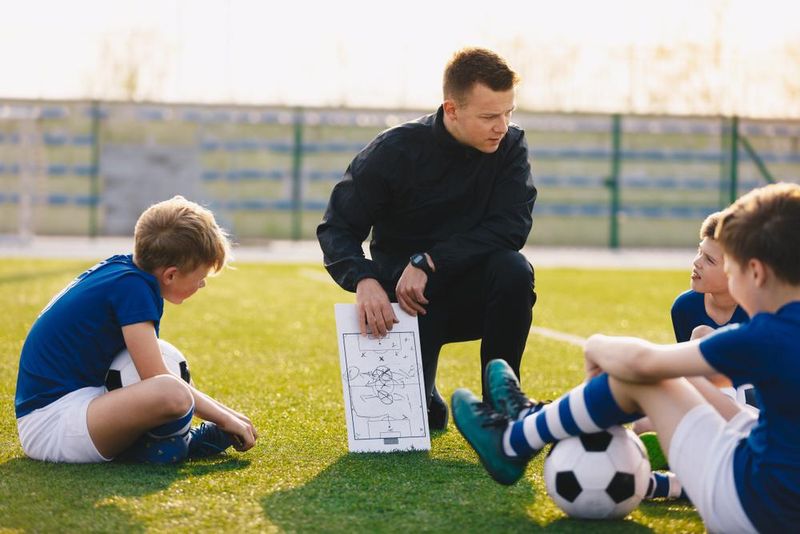
Developing Training Programs and Strategies
One of the primary responsibilities when become a football coach is to develop comprehensive training programs and strategies for their team. They carefully analyze the strengths and weaknesses of their players and design training sessions that focus on skill development, physical fitness, and tactical understanding. These programs aim to enhance the team's performance and ensure that players are well-prepared for upcoming matches.
Tactical Decision-Making during Matches
During matches, football coaches are responsible for making tactical decisions that can influence the outcome of the game. They analyze the opponents' strategies, assess the performance of their own team, and make adjustments accordingly. Whether it's making substitutions, changing formations, or giving instructions from the sidelines, coaches must make quick and effective decisions to give their team the best chance of success.
Player Development and Mentoring
A crucial aspect when become a football coach is player development and mentoring. Coaches identify and nurture the potential in each player, providing them with guidance, feedback, and support. They help players improve their technical skills, tactical awareness, and mental resilience. By fostering a positive and growth-oriented environment, coaches empower players to reach their full potential.
Maintaining Discipline and Team Cohesion
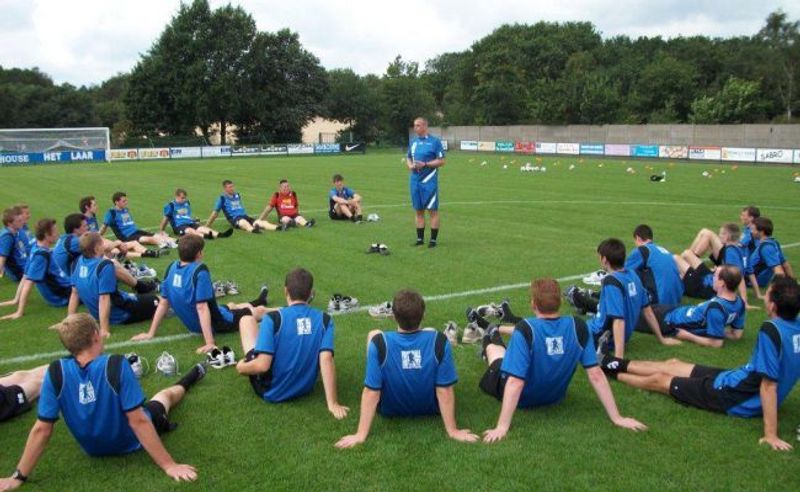
Maintaining Discipline and Team Cohesion
Discipline and team cohesion are essential for a successful football team. Coaches are responsible for setting clear expectations and standards of behavior, ensuring that all players adhere to them. They foster a culture of mutual respect, teamwork, and accountability. By maintaining discipline and promoting unity, coaches create an environment conducive to excellence.
Building Effective Communication Channels
Effective communication is a cornerstone to succeed in the road to become a football coach. Coaches must establish open and honest communication channels with their players, support staff, and management. Clear communication helps in conveying instructions, providing feedback, and addressing any concerns or issues that may arise within the team. Strong communication fosters trust, collaboration, and a shared sense of purpose.
Handling Pressure and Adversities
Football coaches often face immense pressure, both from external expectations and internal aspirations. They must handle high-stress situations with composure and resilience. Coaches serve as a pillar of support for their team during challenging times, guiding them through adversity and instilling belief and determination.
Analyzing Opponents and Planning Countermeasures

Analyzing Opponents and Planning Countermeasures
In order to devise effective strategies, coaches analyze their opponents' strengths, weaknesses, and playing styles. By studying game footage and conducting thorough research, coaches can identify potential vulnerabilities and develop countermeasures to neutralize the opposition's threats. This analysis helps coaches create game plans that exploit the opponents' weaknesses while maximizing their team's strengths.
Providing Emotional Support and Motivation
Football coaches understand the emotional aspect of the game and the impact it can have on players' performances. They provide emotional support and motivation to help players overcome setbacks, build confidence, and maintain focus. Coaches inspire their players to push their boundaries, encouraging them to give their best effort and persevere in the face of challenges.
Collaboration with Support Staff
Successful football coaches recognize the importance of collaboration with their support staff. They work closely with assistant coaches, fitness trainers, nutritionists, and medical professionals to ensure that all aspects of the team's preparation are optimized. Coaches leverage the expertise of their support staff to create a holistic approach to player development and team performance.
Adapting to Changing Game Trends
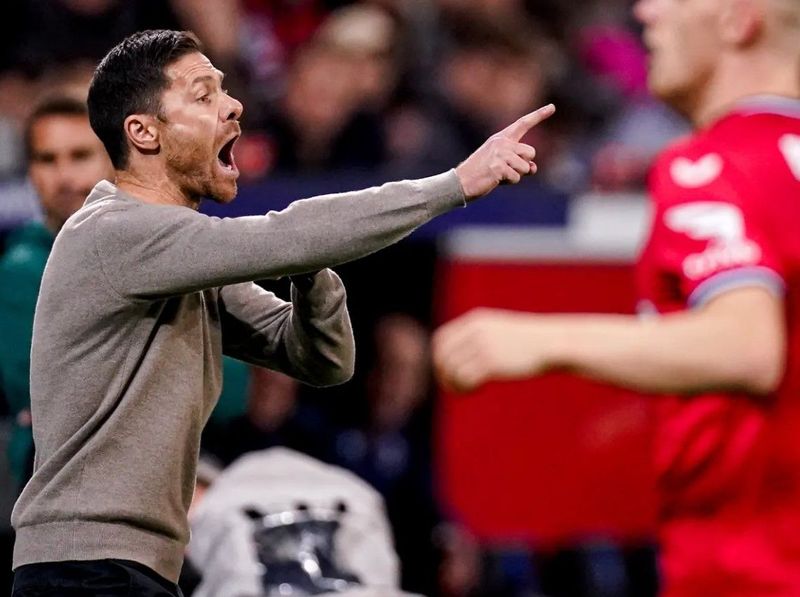
Adapting to Changing Game Trends
Football is an ever-evolving sport, with new strategies, technologies, and trends emerging constantly. Coaches must stay updated and adapt their coaching methods to reflect these changes. They attend conferences, participate in workshops, and engage in continuous learning to ensure they remain at the forefront of coaching innovations.
Monitoring Player Fitness and Nutrition
A coach's responsibilities extend beyond the field. They monitor the fitness levels of their players, working closely with fitness trainers to develop personalized training regimens. Additionally, coaches emphasize the importance of proper nutrition and encourage players to maintain a healthy diet to support their physical and mental well-being.
Ensuring Safety and Injury Prevention
The safety and well-being of players are paramount for football coaches. They take proactive measures to minimize the risk of injuries by implementing appropriate warm-up routines, conditioning exercises, and injury prevention protocols. Coaches work closely with medical staff to ensure players receive the necessary care and rehabilitation in case of injuries.
Evaluating Performance and Implementing Feedback
Continuous improvement is a key principle in football coaching. Coaches regularly evaluate individual and team performances, providing constructive feedback to help players grow. They identify areas for improvement and design training sessions that address specific weaknesses. By emphasizing a growth mindset and implementing feedback effectively, coaches facilitate ongoing development and progress.
How much do football coaches earn?
Answering the question "how much does a person can earn when become a football coach?" is not straightforward as the salary structure varies significantly. At the grassroots level of the sport, coaching positions are frequently voluntary, while wages progressively rise as you ascend the hierarchy.

Football coaches at different level will have different salary level
According to the National Careers Service, a full-time football coach typically begins with an approximate salary of £18,000. However, as one gains more experience, annual earnings can reach closer to £30,000. In the professional football arena, coaches can earn substantially higher incomes, with Premier League managers earning millions.
What are the challenges when become a football coach?

Become a football coach is not easy
Become a football coach is not easy. As a successful strategist, football coaches have to overcome the following difficulties:
- Managing Player Dynamics and Personalities: A football team consists of diverse individuals with different personalities, strengths, and weaknesses. As a football coach, managing these dynamics is essential for fostering a harmonious and cohesive team environment. Balancing player egos, resolving conflicts, and building trust are ongoing challenges that coaches must navigate.
- Balancing Coaching and Personal Life: Coaching is a demanding profession that requires significant time and energy. Finding the right balance between coaching responsibilities and personal life can be a perpetual challenge. Coaches often work long hours, travel frequently, and face immense pressure to succeed. It is essential to prioritize self-care and maintain a healthy work-life balance to avoid burnout.
- Dealing with Pressure and Expectations: Football coaching comes with high expectations from players, fans, management, and even oneself. Coaches must handle immense pressure and stress while remaining focused and composed. The ability to handle pressure positively, make sound decisions, and maintain confidence is a skill that requires constant practice and mental fortitude.
- Overcoming Financial Constraints: Financial constraints can pose significant challenges for coaches, particularly at the grassroots level. Limited budgets may restrict access to quality training equipment, facilities, and specialized coaching staff. Coaches must find innovative ways to overcome these constraints and provide the best possible opportunities for their players.
- Dealing with Injuries and Player Absences: Injuries and player absences are inevitable in football. Coaches must be prepared to manage these setbacks effectively. Developing contingency plans, maintaining squad depth, and providing support and rehabilitation resources are crucial aspects of managing injuries and player absences.
- Coping with Criticism and Handling Critiques: Coaches operate in a high-pressure environment where criticism and scrutiny are commonplace. Handling criticism constructively and using it as an opportunity for growth is a skill that coaches must cultivate. Developing resilience and maintaining belief in their coaching abilities is vital for long-term success.
- Navigating Administrative and Organizational Challenges: Coaches often face administrative and organizational challenges, particularly in professional setups. Dealing with bureaucracy, managing conflicts within the coaching staff, and coordinating with various stakeholders can be time-consuming and demanding. Strong organizational and leadership skills are necessary to navigate these challenges successfully.
How to become a football coach?
Gaining Knowledge and Experience
Become a football coach requires a combination of knowledge and experience in the sport. Whether you aspire to coach a youth team, a college team, or even a professional team, it is essential to lay a solid foundation by learning and gaining experience in football.
Researching knowledge about football
To become a football coach, it is crucial to have a comprehensive understanding of the game. Here are two important ways to emphasize the importance of learning the game:
Research and Study Different Football Strategies, Formations, and Techniques

Research and Study Different Football Strategies, Formations, and Techniques
Immersing yourself in the intricacies of football strategies, formations, and techniques is vital for any aspiring coach. Invest time in researching and studying various playbooks, game plans, and tactics employed by successful coaches and teams. Understand the different offensive and defensive systems, as well as specialized positions, to gain a deeper insight into the game.
Follow Professional Football Leagues and Teams
To broaden your football knowledge, closely follow professional football leagues and teams. Watch matches, analyze game footage, and observe how coaches strategize and make crucial decisions during games. By studying successful coaches, you can learn from their expertise and adapt their techniques to your coaching style.
Participation in Football Activities
Active involvement in football activities not only enhances your personal skills but also provides valuable experience in coaching. Consider the following steps to encourage participation:
Play Football at a Recreational or Amateur Level
Playing football at a recreational or amateur level allows you to experience the game firsthand. It helps you develop a deeper understanding of the physical and mental demands of the sport. By playing different positions and interacting with teammates, you gain insights into team dynamics and the challenges players face on the field.
Volunteer as an Assistant Coach for a Local Team
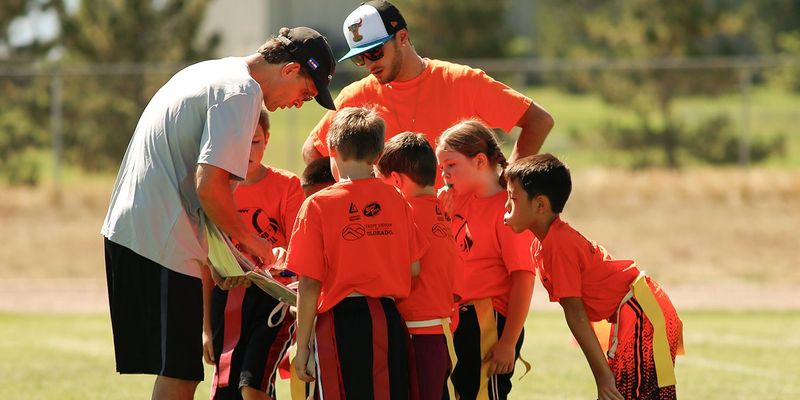
Volunteer as an Assistant Coach for a Local Team
Volunteering as an assistant coach for a local team provides an excellent opportunity to gain practical experience in coaching. Assisting an experienced coach allows you to learn coaching techniques, interact with players, and observe the dynamics of team management. This hands-on experience prepares you for the responsibilities and challenges of coaching a team in the future.
Pursue Formal Education and Certifications
How to become a football coach with no experience? Formal education and obtaining relevant certifications can significantly enhance your credibility in the road to become a football coach.
Enroll in Coaching Courses or Programs
To pursue a career as a football coach, specific qualifications are necessary. These qualifications span various levels, ranging from basic coaching knowledge applicable to amateur or grassroots levels involving children, to more advanced certifications required for coaching adult professional players. Typically, aspiring coaches need to complete lower-level courses, accumulate coaching experience, and progress through the coaching hierarchy to access advanced qualifications. Additionally, it is essential to undertake basic first aid and safeguarding courses as part of the coaching journey.

UEFA course in the road to become a football coach
Here is a compilation of FA/UEFA courses that form the pathway to reaching the pinnacle of the coaching pyramid:
- Introduction to Coaching Football: This online course spans four weeks and provides a foundational understanding of football coaching. Completion of this course is not mandatory for progressing to the next level.
- UEFA C Licence (replacing the discontinued FA Level 2): This 60-hour course offers a comprehensive introduction to coaching at the grassroots level. It is the initial requirement for advancing further up the coaching pyramid.
- UEFA B Licence (previously FA Level 3): This season-long course focuses on age and ability-specific coaching techniques. It equips coaches with the knowledge to develop players up to the senior amateur level. Coaches will learn to design practices tailored to meet their players' specific needs, enhancing their technical, tactical, and physical abilities. Active coaching of a competitive team is a prerequisite for taking this course.
- UEFA A Licence (previously FA Level 4): This course concentrates on advancing technical and tactical coaching skills in 11-a-side football. It aims to prepare coaches for leading a team into matches and is primarily targeted at those working or aspiring to work in the professional game. Active coaching is required, and priority is given to full-time coaches in the senior professional game.
- UEFA Pro Licence (previously FA Level 5): This represents the highest coaching qualification available. It is designed for experienced coaches within the professional game who aspire to become head coaches of professional teams.
Obtain Coaching Licenses and Certifications
Acquiring coaching licenses and certifications adds credibility to your coaching profile. Research the licensing requirements in your region and pursue the necessary certifications. These credentials demonstrate your commitment to professional development and make you more desirable to potential employers or teams.

C Diploma
UEFA offers a range of coaching diplomas that are required to be obtained through appropriate training before become a fotoball coach:
- C Diploma: This initial course focuses on training coaches to create an enjoyable learning environment that enhances players' knowledge and skills. It serves as an introductory training program that establishes the foundations for developing coaching skills.
Duration: 60 hours. - B Diploma: Coaches must hold a valid UEFA C licence and have completed a minimum of six months of coaching experience to be eligible for this course. Participants will learn techniques to improve individual and team performance. They will gain the ability to analyze players' work, provide assessments, and develop improvement plans for performance. These techniques can be applied across different age groups and skill levels, ranging from youth to senior amateur.
Duration: 120 hours. - A Diploma: Coaches must possess a valid UEFA B Licence and have at least one year of coaching experience as an 11-a-side football coach after completing the UEFA B Licence. This course covers coaching up to the highest amateur level. It delves into understanding external factors that impact the game and emphasizes a technical approach to comprehending player and team levels, as well as the responsibilities involved in managing a club. Topics such as pressing, intensity, and opponent analysis gain significance. Coaches learn to design training sessions, develop strategies, and motivate their players.
Duration: 180 hours. - Pro Diploma: Coaches must hold a valid UEFA A Licence and have completed at least one year of coaching experience as a first coach in elite youth or senior amateur football, or as an assistant coach in professional football. This course simulates the experience of coaching at a professional level. It provides a comprehensive understanding of players and teams, enabling coaches to develop a winning philosophy and techniques to foster a high-performance culture.
Duration: 360 hours.
Developing Coaching Skills
Communication and Leadership
Effective communication and strong leadership are fundamental aspects in the road to become a football coach. These skills are crucial for building a cohesive team and establishing a positive environment.
Effective Communication with Players, Staff, and Parents
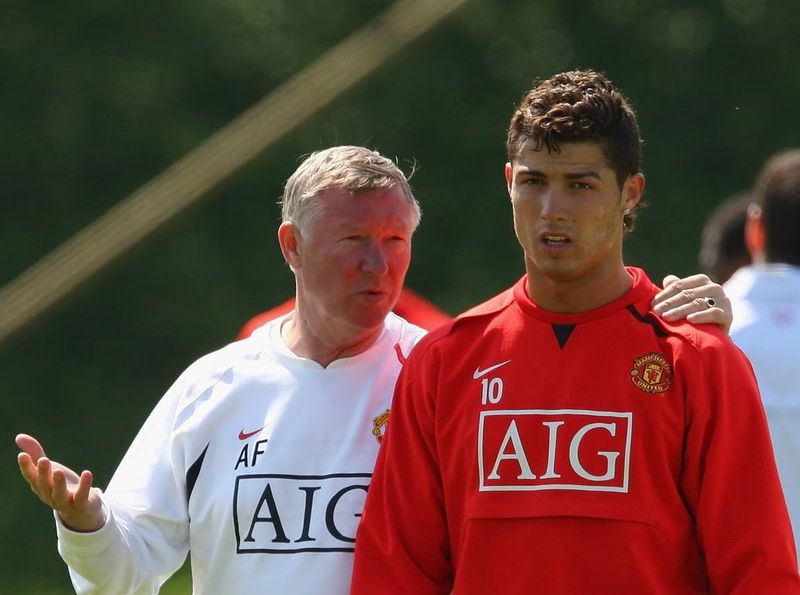
Developing Communication with Players
A football coach must be able to communicate effectively with players, coaching staff, and parents. Clear and concise communication ensures that everyone involved understands their roles and responsibilities. It is important to provide feedback and instructions in a manner that is easily understood by all, regardless of their football knowledge or experience. Good communication fosters trust, cooperation, and unity within the team.
Building Trust and Rapport with the Team
Building trust and rapport with the team is essential for a football coach. Players are more likely to respect and follow a coach they trust and feel connected to. Establishing open lines of communication, being approachable, and actively listening to players' concerns and ideas are key to building strong relationships. By creating a supportive and inclusive environment, coaches can motivate players to perform at their best and foster a sense of camaraderie within the team.
Tactical Knowledge and Analysis
A football coach needs to possess a deep understanding of the game, including different playing styles, formations, and strategies. Tactical knowledge and analysis play a vital role in developing effective game plans and maximizing the team's performance.
Understanding Different Playing Styles and Formations
A competent coach should have a comprehensive understanding of various playing styles and formations. This knowledge allows them to adapt their strategies based on the team's strengths, weaknesses, and the opponents they face. By tailoring the team's approach to different situations, coaches can exploit the opposition's vulnerabilities while capitalizing on their own strengths.
Analyzing Opponents and Developing Game Strategies

Developing Tactical Knowledge and Analysis
Analyzing opponents is an integral part of a coach's role. By studying the opposition's strengths, weaknesses, and patterns of play, coaches can devise effective game strategies. This includes identifying key players to neutralize, exploiting weaknesses in the opposition's defense or midfield, and developing offensive tactics that suit the team's style of play. Thorough analysis and strategic planning give the team a competitive edge on the field.
Player Development and Motivation
A football coach plays a crucial role in the development and motivation of individual players. It is essential to identify their strengths and weaknesses, provide targeted training programs, and create an environment that encourages growth and improvement.
Identifying Individual Strengths and Weaknesses
Each player has unique strengths and weaknesses that should be identified by the coach. Understanding the individual capabilities of players allows coaches to tailor training programs and position them in roles that best utilize their skills. By recognizing and nurturing talent, coaches can help players reach their full potential and contribute significantly to the team's success.
Implementing Training Programs and Drills for Skill Enhancement
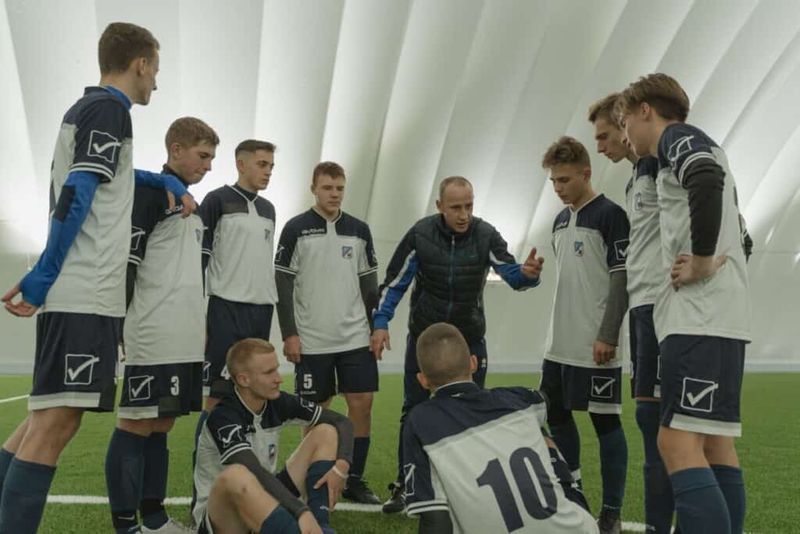
Study the ways to increase player development and motivation
Coaches are responsible for implementing effective training programs and drills to enhance players' skills. By designing structured and progressive training sessions, coaches can focus on developing specific technical abilities, physical fitness, and tactical awareness. Varied and challenging drills keep players engaged and motivated, while targeted skill development helps them become more competent on the field.
Fostering a Positive and Motivating Team Environment
Creating a positive and motivating team environment is vital for player development and overall team cohesion. Coaches should encourage a supportive culture where players feel valued, encouraged, and motivated to give their best effort. By recognizing and praising individual and team achievements, coaches can boost morale and foster a strong sense of unity among players.
Networking and Building Connections
Networking and building connections play a vital role in your journey towards finding out the answer for "how to become a football coach" issue.
Attend Coaching Conferences and Workshops
One of the best ways to enhance your networking opportunities as a football coach is by attending coaching conferences and workshops. These events bring together coaches from various backgrounds, experience levels, and coaching philosophies. Here's how attending coaching conferences and workshops can benefit you.
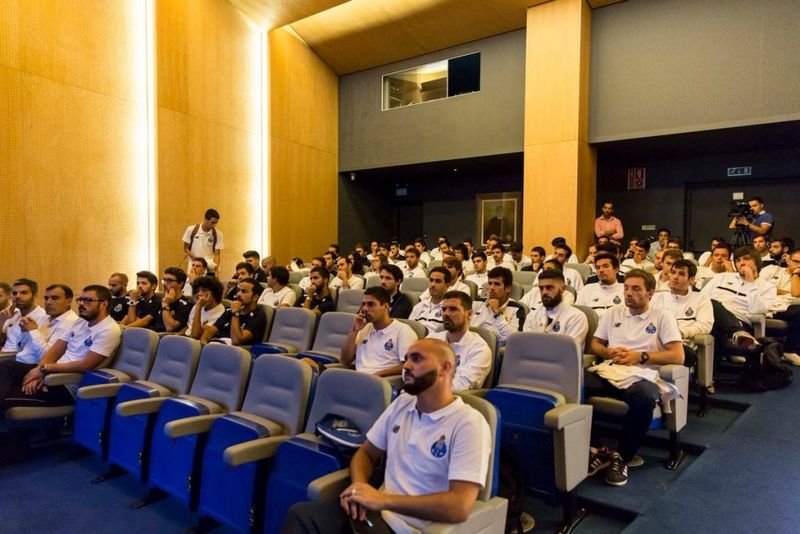
Attend Coaching Conferences and Workshops is important for football coaches
Expanding your Knowledge and Skills
Coaching conferences and workshops provide a platform to learn from industry experts and experienced coaches. Through keynote speeches, panel discussions, and interactive sessions, you can gain valuable insights into the latest coaching methodologies, strategies, and trends. This exposure will broaden your knowledge base and equip you with innovative techniques to excel in your coaching career.
Connecting with Like-Minded Professionals
Networking is a fundamental aspect of coaching conferences and workshops. These events offer opportunities to connect with like-minded coaches who share your passion for football. Engage in conversations, exchange ideas, and build relationships that can lead to potential collaborations, mentorships, or job opportunities. Remember, the coaching community is a tight-knit group, and building connections is crucial for your professional growth.
Showcasing your Expertise
Presenting at coaching conferences and workshops is an excellent way to establish yourself as an authority in your field. By sharing your knowledge and experiences through presentations or workshops, you can gain recognition and credibility within the coaching community. This recognition can open doors to new opportunities and attract aspiring coaches who seek guidance from industry experts like yourself.
Join Coaching Associations and Organizations
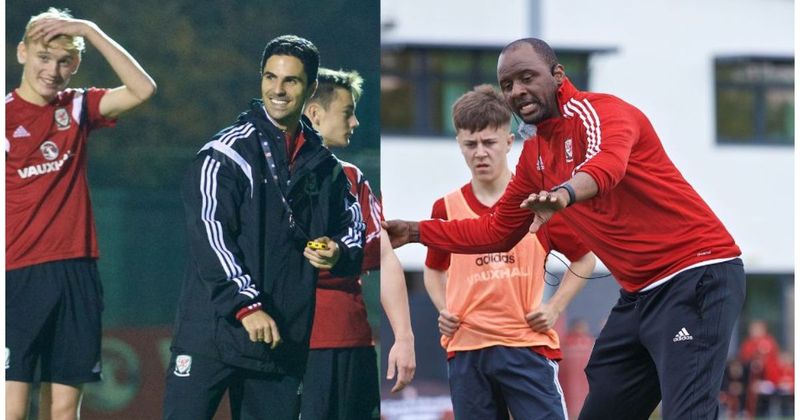
Join Coaching Associations and Organizations is a step for fooball coaches
Another effective strategy for networking and building connections as a football coach is to join coaching associations and organizations. These associations serve as valuable platforms to connect with fellow coaches, access educational resources, and stay updated with industry advancements. Let's explore the benefits of becoming a member:
Networking Opportunities
Coaching associations and organizations bring together coaches from various levels, including grassroots, amateur, and professional. By joining these networks, you gain access to a community of coaches who share your passion and dedication. Engage in discussions, attend meetups or conferences organized by these associations to foster relationships and exchange ideas with coaches who have similar aspirations.
Professional Development
Coaching associations and organizations often provide professional development opportunities, such as webinars, workshops, and seminars. These resources enable you to enhance your coaching skills, stay updated with the latest trends, and gain insights from experienced professionals. By actively participating in these programs, you demonstrate your commitment to continuous growth and improvement, which can enhance your professional reputation.
Access to Job Opportunities
Coaching associations and organizations often have dedicated job boards or career resources. By being an active member, you increase your chances of discovering coaching vacancies, internships, or other opportunities within the industry. These platforms serve as valuable resources for career advancement, allowing you to explore new coaching roles or find mentors who can guide you towards your goals.
Network with Other Coaches, Scouts, and Industry Professionals
In addition to attending conferences, workshops, and joining coaching associations, networking with other coaches, scouts, and industry professionals is essential to broaden your connections within the football coaching realm. Here's how you can engage with these individuals effectively:
Attend Local Events and Matches
Local events, matches, and tournaments are great opportunities to connect with other coaches, scouts, and industry professionals. Whether it's a youth football game or a local coaching clinic, actively participate, strike up conversations, and engage with those around you. Be genuine in your interactions and show a sincere interest in their experiences and perspectives.
Utilize Online Platforms and Social Media

Utilize Online Platforms and Social Media
In today's digital age, online platforms and social media play a significant role in networking. Join football coaching groups on platforms like LinkedIn or Facebook, participate in discussions, and contribute valuable insights. Engage with other coaches, scouts, and professionals by commenting on their posts, sharing relevant content, and reaching out for conversations. Social media platforms also allow you to showcase your coaching philosophy, achievements, and expertise, helping you establish an online presence.
Volunteer and Assist
Offering your assistance as a coach or scout for local teams, camps, or community programs is an excellent way to connect with others in the industry. By volunteering your time and expertise, you not only contribute to the development of aspiring athletes but also build relationships with fellow coaches and professionals. The bonds formed through shared experiences can lead to referrals, recommendations, or collaborative projects in the future.
Practical Experience and Career Advancement
Seek Coaching Opportunities at Various Levels
To embark on a career the journey to become s a football coach, it's essential to seek coaching opportunities at various levels. Starting from grassroots and amateur teams, such as community clubs or recreational leagues, provides an excellent foundation for building coaching expertise. By working with players at these levels, you can refine your communication and leadership skills while gaining practical experience on the field.
Coaching at lower levels also allows you to understand the fundamentals of the game, develop a coaching philosophy, and learn how to effectively tailor your coaching methods to different skill levels. The hands-on experience gained during this stage will prove invaluable as you progress in your coaching career.
Apply for Assistant Coaching Positions
One of the key steps in advancing your coaching career is to apply for assistant coaching positions. Assistant coaching roles can be found in various settings, such as professional teams, college programs, or even high school squads. As an assistant coach, you'll have the opportunity to work closely with experienced head coaches, learn from their expertise, and contribute to the team's success.

Apply for Assistant Coaching Positions is also an ideal way to become a football coach in the future
Assisting a seasoned coach provides valuable mentorship and insights into the intricacies of team management, player development, and game strategies. You'll also have the chance to observe and learn from different coaching styles, which will help you refine your own coaching approach. By demonstrating your dedication, knowledge, and commitment as an assistant coach, you'll enhance your prospects for future career advancement.
Consider Coaching in Youth Leagues, High Schools, or College Teams
Coaching in youth leagues, high schools, or college teams offers unique opportunities for personal growth and career advancement. Youth leagues provide a nurturing environment where you can focus on player development, instilling the fundamentals of the game, and fostering a love for football. Coaching at this level requires patience, excellent communication skills, and the ability to create a positive and supportive atmosphere.
High schools and college teams present more competitive environments, where the emphasis is on strategic gameplay and achieving success. Coaching in these settings allows you to work with talented athletes and guide them toward reaching their full potential. Additionally, high-profile coaching positions in renowned schools or colleges can attract attention and open doors to further career opportunities.
Continually Learn and Adapt Through On-the-Field Experience
One of the key aspects of career advancement when become a football coach is to continually learn and adapt through on-the-field experience. The football landscape is constantly evolving, with new tactics, technologies, and training methods emerging. Staying up-to-date with the latest trends and advancements in the game is crucial to remaining competitive and delivering effective coaching.
On-the-field experience provides valuable insights and opportunities for growth. Actively participating in coaching clinics, attending workshops, and pursuing coaching certifications can enhance your knowledge base and demonstrate your commitment to professional development. Embracing new ideas, experimenting with innovative techniques, and integrating them into your coaching style will set you apart as a forward-thinking coach.
Continued Professional Development
Stay Updated on the Latest Football Trends and Developments

Stay Updated on the Latest Football Trends and Developments is very important
To remain relevant and effective after become a football coach, it is vital to stay informed about the latest trends and developments in the sport. This involves keeping up with rule changes, tactical innovations, and advancements in training methodologies. By staying updated, coaches can incorporate new ideas into their coaching philosophy, create innovative training sessions, and provide their players with the most relevant and up-to-date guidance.
Attend Coaching Seminars and Webinars
Coaching seminars and webinars offer excellent opportunities for professional development. These events bring together experienced coaches, industry experts, and thought leaders who share their knowledge and experiences. Attending such seminars and webinars allows coaches to learn from the best in the field, gain fresh perspectives, and acquire valuable insights into effective coaching methods. Additionally, these events provide a platform for networking with other coaches and building connections within the football community.
Read Books and Articles Written by Experienced Coaches

Read Books and Articles Written by Experienced Coaches is a way to update strategy in become a football coach
Books and articles authored by experienced coaches serve as invaluable resources for continuous learning. They offer in-depth analysis, practical tips, and real-life anecdotes that can greatly benefit aspiring and seasoned coaches alike. By reading a wide range of materials, coaches can expand their knowledge base, explore different coaching philosophies, and find inspiration to enhance their own coaching style. It is essential to seek out reputable sources and critically evaluate the information to ensure its credibility.
Reflect on Personal Coaching Experiences and Seek Feedback
Self-reflection is a powerful tool for personal growth and development. Coaches should regularly reflect on their coaching experiences, analyzing their successes, challenges, and areas for improvement. By critically evaluating their coaching methods, decision-making processes, and communication skills, coaches can identify areas that require further development. Seeking feedback from players, fellow coaches, and mentors is also crucial, as it provides valuable insights and perspectives that can enhance coaching effectiveness.
FAQs - How to become a football coach?
- Football managers are usually individuals who have previously played the sport professionally, although there are exceptions. It is indeed possible to become a football manager without a playing background, but it necessitates a significant investment of time in acquiring coaching certifications.
- A player-coach, also known as a playing coach, captain-coach, or player-manager, refers to a team member who fulfills dual responsibilities of playing and coaching. This individual can serve as either a head coach or an assistant coach.
- There have been several famous football coaches throughout history. Some notable examples include Sir Alex Ferguson, Pep Guardiola, Arsène Wenger, and Jurgen Klopp.
- Coaches manage conflicts by fostering open communication, creating a supportive team culture, and addressing issues promptly and impartially. They encourage players to resolve conflicts through constructive dialogue and emphasize the importance of teamwork.
- There are many successful coaches who never played football such as: Arrigo Sacchi, Carlos Alberto Parreira, Avram Grant, Bill Stuth, Andre Villas-Boas, Brian Kerr, Guy Roux, Gerard Houllier, Paul Clement.
Related Content



























